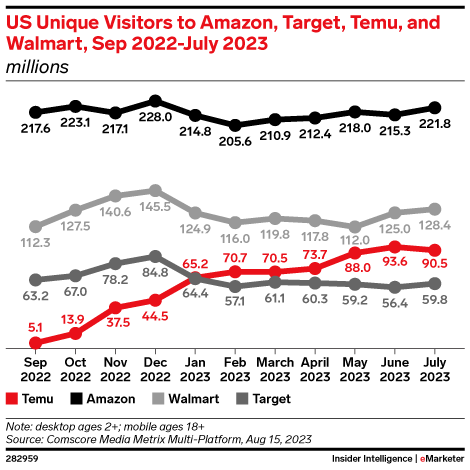The Biden administration wants to eliminate a loophole in tax laws that has allowed Chinese ecommerce giants, namely Temu and SHEIN, to offer ultra-cheap items to Americans.
Called the “de minimis” rule, this regulation allows packages worth less than $800 to enter without almost any taxes. Though it was originally meant to ease the process of sending low-cost packages through regular customs, companies like Temu and SHEIN have figured out how to use this rule to overwhelm the market with inexpensive products.
Instead of shipping products in large numbers to warehouses in the US to be distributed later, they send packages directly to consumers to dodge the associated taxes.
White House officials claim that the problem has gotten too big and estimate that $1 billion worth of goods entered the economy in 2023. This is close to 10 times more than the volumes registered ten years ago.
US Customs and Border Protection data revealed that between 2018 and 2021, approximately 60% to 80% of these shipments originated from China and Hong Kong.
Their research also highlighted that SHEIN and Temu accounted for more than 30% of all the packages shipped to the US so closing this loophole could be extremely consequential.
Critics argue that this loophole has enabled Chinese ecommerce giants to undercut American businesses on a wide range of products, putting them out of business.
Shein Pays No Import Duties While Gap Spends $700M a Year
The impact on American retailers is significant and they have already complained that they are facing a disadvantage compared to these Chinese companies. For example, large retailers like Gap and H&M paid $700 and $205 million in import duties respectively in 2022.

However, SHEIN and Temu paid no import duties at all during this period as their model is built around the “de minimis” loophole. As a result, its competitors have struggled to offer prices that match the bargains that this type of company can offer.
Also read: The History of SHEIN: Guangzhou Dropshipper to Global Fashion Phenomenonal
Moreover, lawmakers have raised concerns about the unlawful exploitation of the rule as Chinese companies are known for engaging in unethical business practices that may include child labor, counterfeit, goods that fail to meet minimum health requirements, and the commercialization of illicit drugs.
By sending packages directly, most of these imported goods avoid the usual customs screening that helps filter products, substances, and merchandise that violate US laws.
The White House Proposes to Treat Chinese-Originated Shipments Differently
The Biden administration is proposing to curtail the “overuse and abuse” of this exemption by prohibiting products that come from China from being eligible for the “de minimis” treatment.
Another proposal would be to assign a specific tariff classification number to goods coming from China that would apply for the “de minimis” treatment. The idea behind this modification is simply to increase transparency and accountability.
However, the White House is pressuring Congress to draft new laws that deal with this issue more extensively and prevent Chinese ultra-cheap goods from harming American manufacturers and retailers.
Ecommerce platforms outside of the US like SHEIN would be impacted significantly by these new rules as the cost of their merchandise will immediately skyrocket. This could endanger their business model and appeal to consumers.
Temu and Shein Reject the Notion That Their Models Depend on the “De Minimis” Rule
SHEIN, Temu, and American shoppers may not be happy about these proposals, but authorities claim that they should lead to better quality of the products available in the US market in the long run.
The changes would force companies that rely on these models to restructure their approach and make significant changes to their operations. Yin Xinwei, a Shenzhen-based seller, is already exploring alternatives like shipping products in bulk to US warehouses to serve customers.
“Without the exemption, the costs will be higher,” Xinwei quickly asserted.
US-based manufacturers and retailers would likely benefit as they would be able to compete with these companies on a more leveled playing field.
Both Temu and SHEIN have responded to these developments stating that their business models do not solely depend on the de minimis exemption.
Temu says its low prices come from a smart business model that “eliminates unnecessary middlemen,” while SHEIN claims its success is “based on our unique on-demand business model” and has shown support for “responsible reform” of the de minimis rule. Even though these models take advantage of the loophole, they might still provide cheaper products than US ecommerce sites like Amazon due to their strong partnerships with manufacturers.
“We are reviewing the new rule proposals and remain committed to delivering value to consumers,” said a spokesperson from Temu.
Meanwhile, Peter Pernot-Day, head of strategic communications for Shein, commented: “We are in favor of working with stakeholders in government and in industry to reform the ‘de minimis’ exception,”
However, the proposed changes could still significantly impact their operations and pricing strategies.
New President, New Rules?
The Biden administration’s proposal marks a drastic move to address the flood of ultra-cheap goods that have hit American shores recently.
However, the path forward is full of obstacles. The proposed rules will still go through public comment period before they are finalized, a process that could extend beyond the current administration’s term.
Also read: Is SHEIN Safe? How to Shop Securely on the Most Viral Online Store of 2024
Moreover, the implementation and enforcement of new regulations on millions of daily shipments present logistical challenges.
Furthermore, the potential for retaliatory measures from China could further complicate international trade relations.
This move adds another layer of complexity to the already tense trade relations between the world’s two largest economies. It aligns with broader efforts from the US to reduce dependence on Chinese imports and protect local businesses.
As the situation unfolds the era of unlimited ultra-cheap imports from China may be coming to an end for American consumers. While this could mean short-term price increases, proponents argue that it’s a necessary step to protect national interests.
